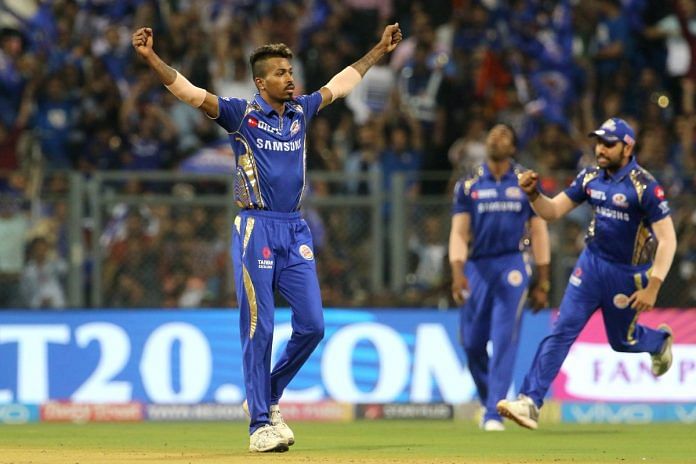The CoA gave free passes to serving judges, even as it drastically reduced the number allotted to MCA management.
Mumbai: A court-appointed Committee of Administrators (CoA) running the Mumbai Cricket Association (MCA) has locked horns with the management over the distribution of complimentary passes to Indian Premier League (IPL) matches earlier this year.
The CoA, comprising former Supreme Court judge Hemant Gokhale and former Bombay high court judge V.M. Kanade, raised several eyebrows by allotting 80 free passes for members of its own fraternity — serving judges.
Further riling the MCA’s management committee members, it drastically reduced the number of passes allotted to them this season, and also cut down the quota for the chief minister’s office as well as other state government departments.
The committee was put in place to reform the cricket body’s functioning and ensure implementation of the Supreme Court-mandated Lodha Committee recommendations. With apprehensions over mismanagement in the distribution of passes, the CoA was also solely put in charge of the sale and distribution of tickets for IPL matches at Mumbai’s Wankhede Stadium.
‘Completely mismanaged’
“The whole thing is completely mismanaged and wrong. Unfortunately, there are important people being hurt in the new system of distribution of passes, be it government officials or people in semi-government agencies or others,” a source close to members of the MCA’s managing committee said on the condition of anonymity. “This will disturb the MCA’s relations with them and will be detrimental to the cricket body’s long-term interests.”
Moreover, while the CoA was expected to rationalise the distribution of complimentary passes, it did little to change the norm of handing out free tickets to the very agencies and people in-charge of giving permissions for IPL matches or for providing services.
Accordingly, the senior police inspector at the Marine Drive police station and the assistant commissioner of police at the Colaba Police station, close to the Wankhede stadium, got four passes each. The office of the Brihanmumbai Municipal Corporation’s (BMC) A ward, under whose jurisdiction Mumbai’s Wankhede stadium falls, was given 15 passes, the fire brigade got four passes and so on.
‘List speaks for itself’
The CoA distributed the complimentary passes for all matches from the second match onwards. Passes for the first match, held on 7 April, before the CoA took over the MCA’s reins, were distributed by the MCA office bearers led by the then chairman Ashish Shelar, a Bharatiya Janata Party (BJP) legislator.
While the categories for the allotment, by and large, remain the same between the two lists, there are some differences.
Kanade, one of the two CoA members, declined comment. “You examine the list, which we have put in public domain. It speaks for itself,” is all he said.
What has become a bone of contention is the CoA’s decision to allot 80 passes for serving judges of the Bombay high court, small cause court and the city civil court.
“Earlier, Mumbai judges used to get two passes each. But, over the years, the MCA diverted these passes to other people, mostly politicians and managing committee members. The CoA decided to restore the practice. Some of these changes have not gone down well with many people,” a source close to the CoA said.
After it took over, the CoA also slashed the number of passes given to managing committee members to about a tenth of what they had received for the first IPL match.
For the first match, the MCA kept aside 383 of the 4,550 passes for managing committee and ex-officio members, and 199 for MCA staff members. In contrast, the CoA allotted 35 passes to the managing committee members — 10 for the chief executive officer and five each for the members — and 146 for MCA staff.
It also trimmed the number of passes for committee members and the CEO to the elite president’s box, giving 12 in the subsequent matches as against 19 in the first match.
CoA discretion
The CoA kept 25 passes each for the two committee members to be distributed at their discretion. It also allowed eight passes to the president’s box to the CoA and two to the consultant to the CoA.
The committee retained the norm of 50 passes to government departments and local bodies, and 50 to the Mumbai Police, to be issued on demand by MCA officials.
However, outside of these, within allotments to specific government agencies, the CoA cut the CM office’s quota to five from 10 in the first match. Passes to the state sports department, the office of the deputy director of sports, and the Income Tax office too were slashed to five from 10 in the first match.
A former cricket administrator who did not wish to be named said a few managing committee members vociferously objected to some of the CoA’s decisions in a meeting Wednesday evening.
More passes for players
One of the major changes brought in by the CoA in the distribution of the free IPL passes was to have more tickets for cricket players. The MCA managing committee handed out 168 passes to Ranji players, test cricketers from the city and first-class umpires for the first IPL match.
The CoA increased this allotment to 350 passes from the second match onwards, giving two complimentary tickets to Ranji players this time instead of the usual one.
Besides these, the CoA also kept aside passes especially for women cricketers, women selectors and coaches, blind cricketers, physically handicapped cricketers, among others.
“Since there were allegations earlier that complimentary passes given by the MCA often make their way to the black market, this time the tickets were stamped ‘not for sale’. The MCA also took an undertaking from all its clubs that they will not sell the tickets allotted to them,” said a source who did not wish to be named.



